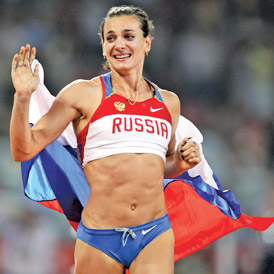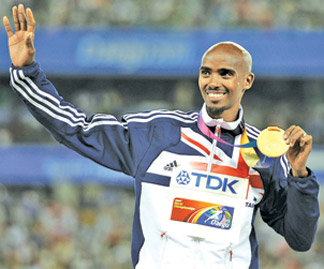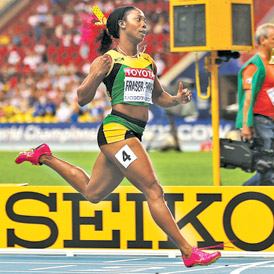|
REVIEW:
Too many competitions prevent world records
Dinesh Weerawansa after a tour of Russia
World Championship which was concluded at Luzhniki Stadium in the
Russian capital of Moscow last Sunday was a significant one for Sri
Lanka, which produced a finalist only for the third time in the
30-year-old championship history.
|

Usain Bolt |
The atmosphere was ideal for Russia to host the IAAF World
Championship for the first time at an important juncture as they prepare
to host the Winter Olympics in Sochi next year and the FIFA World Cup in
a couple of years time.
On the other hand, it was a memorable one for yours truly who was
covering his seventh successive World Championship in Athletics for
Sunday Observer and Daily News after Edmonton 2001 in Canada, Paris
Saint Dennis 2003 in France, Helsinki 2005 in Finland, Osaka 2007 in
Japan, Berlin 2009 in Germany and Daegu 2011 in South Korea.
It was sprinter Susanthika Jayasinghe who had made it to finals on
both the previous occasions. Jayasinghe went on to win medals on both
the occasions she had made it to the finals of her pet event - a silver
behind Ukraineís Zahana Pintusevich-Block in Athens 1997 and a bronze
ten years later in Osaka 2007.
Ace woman javelin thrower Nadeeka Lakmali became only the second Sri
Lankan athlete to qualify for a final in the IAAF World Championship
history after Jayasinghe when the lass from Elpitiya made it to the
final of the womenís javelin throw at Moscow 2013 Championship.
Some athletic pundits and scribes may argue that Lakmali could not
better even her own Sri Lanka record in Moscow. Such arguments are good
for people with a limited knowledge on track and field sport, to go
merely by distance or timing. But if one is to make a careful analysis,
it is not only the distance but several other factors too should be
taken into account. Among them are the wind gauge, humidity, temperature
and performance of the other competitors.
Of the 12 finalists who competed in womenís javelin throw, only one
athlete came out with personal best - Australian Kimberley Mickle who
threw 66.60m, that too in her sixth and final attempt. If not for that
and her second attempt of 66.25, she wouldnít have won the silver medal.
Even the gold medallist Christina Obergfoll of Germany finished well
behind her personal best of 70.20m. But her throw of 69.05m was good
enough to finished first.
Lakmali Ė satisfying performance
Hence, Lakmaliís performance of 58.16m in the final is something Sri
Lanka could look forward to future with confidence. That was the best in
three attempts by Lakmali as only the top eight thereafter were given a
chance to complete six attempts. Who knows whether Lakmali would have
set a new Sri Lanka mark and achieved her personal best if she had got
the next three attempts! Lakmali should be commended for her performance
of 60.39m in the qualifying round which earned her a place in the final.
Olympic silver medallist Jayasinghe too has admired Lakmaliís feat,
saying that it is even more difficult to enter a field event such as
javelin throw which involves a lot of technique and expertise compared
to 200m. It is heartening to hear celebrated Sri Lanka athlete such as
Jayasinghe commending Lakmaliís feat.
However, hurdler Christine Sonali Merril painted a poor picture. She
finished last in her heat and was disqualified for violating IAAF rule
168.7 (a) involve hurdling. It is unfortunate that an athlete of her
calibre, based in California, USA and training with modern techniques,
made such a mistake.
Certain local scribes have blamed her as if she had made a wild card
entry at Sri Lankaís expense. Merril came to Moscow as a direct
qualifier under ĎBí category as Lakmali. Even Sri Lankaís menís 4 x 400m
relay team qualified to compete in Moscow under the same category.
Hence, it is commendable for Lakmali, Merril and the menís relay team to
qualify and earn their places, rather than begging for wildcards.
True that Sri Lankaís menís 4 x 400m relay team could not display the
same performance they displayed at last monthís Asian Championship to
win a bronze medal. If we had taken better care of those youth after the
Pune triumph, they would have been able to deliver the goods, perhaps
they would have made it to the finals.
Sri Lankaís menís team morale low
|

Yelena Isinbayeva
|
The morale of Sri Lankaís 4 x 400m relay team was at low ebb. Some of
them had used plasters to cover their torn spikes. It became even
tougher for Sri Lanka which was drawn in a tougher heat two in which all
other seven teams, except for Sri Lanka came out with their seasonís
best in the qualifying round itself. Sri Lanka finished last in the heat
with a timing of three minutes, 6.59 seconds.
It was the worst among the 24 teams which took part in the three
heats. They failed to come anywhere near their Asia Championship
medal-winning performance of 3:04.92 in Pune last month.
The 14th IAAF World Championship did not produce a single world
record. There was only a solitary World Championship record in Moscow
with Ukrainian Bohdan Bondarenko clearing 2.41m in menís high jump. The
main reason for the record drought is excessive competition.
The lucrative Diamond League has stretched the elite athletes to
their maximum and some looked exhausted event before the most important
event in the world athletic calendar. Hence, most athletes merely
competed for their medals and were not worried about records at all.
Even the worldís fastest man, Usain Bolt of Jamaica, who established
back to back sprint records at the 2009 World Championships in Berlin,
which the writer was fortunate enough to witness the Jamaican sprint
merchant doing 100m in 9.58 seconds and 200m in 19.19 seconds.
Bolt underlines supremacy
Reigning champion Bolt underlined his supremacy as the fastest man on
earth when he bagged menís 100m title with a seasonís best timing of
9.77seconds. The Jamaican sprint merchant made a creditable comeback
after being disqualified in the final of the same event for a false in
Daegu two years ago.
It appears that Jamaica has completely taken over the world track
supremacy from the United States. The days when the Americans swept the
boards and occupied all three positions in victory podiums in the sprint
events of world track and field meets are no more, with the emergence of
the new generation sprint merchants from Jamaica. The Jamaican thunder
storm in world athletic reached the peak when they pocketed all six
sprint golds on offer 100m, 200m and 4 x 100m relays for men and women.
The mighty Jamaicans have been unstoppable both in the menís and
womenís events. Bolt, who added the Moscow 2013 World Championship title
to his London Olympic 100m gold, lived up to expectations. In exactly 24
hours after Bolt accounted for the menís 100m gold, his Jamaican
team-mate Shelly-Ann Fraser-Pryce triumphed in womenís 100m dash with
the biggest winning margin in the 30-year-old World Championships
history.
FraserĖPryce Ė second fastest time
With such tough opposition - a race that included the second-fastest
woman of all-time and five other GGGwomen with personal bests of below
10.9 seconds, Fraser-Pryce knew that she could not leave room even for a
slightest error.
There was no looking back for Fraser-Pryce and she continued to pull
away from the field, stopping the clock in this yearís world-leading
time of 10.71 seconds. Running against the wind (- 0.3m/s), it was the
second-fastest time of her career, just one hundredth of a second short
of her personal best recorded last year.
Russia and Jamaica posed the biggest threat to the US dominance in
track and field, After five successive championship triumph, the USA
failed to head the final medal standings as the hosts Russian beat them
in a thriller by a solitary gold medal. Jamaica maintained its track
supremacy with Bolt and Shelly-Ann Fraser-Pryce completing a golden hat
trick each.
Bolt capped the competition with his third scorching performance on
the final day, running away from the 4x100m relay field to give Jamaica
gold for the third consecutive championships and secure a relay double
for Jamaica, who also won the womenís race.
The shorter relay was a wild affair with several teams in contention
up to the last exchange. There, at the top of the homestretch, Bolt got
the baton from Nickel Ashmeade more or less equal with the USA quartet.
Bolt then simply left Justin Gatlin in his wake, opening a gap
immediately and bringing the Jamaican squad home in 37.36 to the USAís
37.66.
US women matches Boltís running
|

Mo Farah
|
Boltís successful anchor leg, while impressive, was equalled in its
dominance by the performance of the womenís team. The quartet of Carrie
Russell, Kerron Stewart, Schillonie Calvert, and double sprint champion
Shelly-Ann Fraser-Pryce set a championship and national record of 41.29
by handing Fraser-Pryce the baton with a sizeable lead and pointing the
ĎPocket Rocketí at the finish line.
While Jamaica maintained its class in sprints, Great Britainís 2012
Olympic hero Mo Farah lived up to expectations as the hot favourite in
middle distance running. He proved that his golden double at London
Olympics was not a surprise due to home advantage and accounted for both
the menís 5,000m and 10,000m titles in Moscow 2013.
Farah underlined his supremacy with a seasonís best 27 minutes and
21.71 seconds to win the menís 10,000 final. The Somali-born long
distance champion kept his cool to push Ibrahim Jeilan (who beat Farah
in Daegu 2011) to the second place, though the Ethiopian surprise too
clocked his seasonís best 27:22.23.
True that the Bolt was hero of all but the cynosure of all eyes was
celebrated Russian pole vaulter Yelena Isinbayeva. There is no doubt
that womenís pole vault is one of the most favourite event in any
athletic calendar. If Ukraine Sergey Bubka could rightly be called the
king in pole vault, the queenís title would undoubtedly go to Russian
Isinbayeva.
Russian Isinbayeva Ė the star
Isinbayeva won her Third World Championship gold in front of her home
crowd on what could be remembered as ĎTerrific Tuesdayí. She came out
with a magnificent performance before cheering home supporters to pocket
her third gold l in womenís pole vault in the World Championship
history. A miss at her opening height did not shake her and she duly
sailed over 4.65m on her second attempt. She then cleared 4.75m at the
first time of asking, but didnít take the lead as Olympic champion Jenn
Suhr and Germanyís Silke Spiegelburg had also cleared that height with
faultless records up to that point. Cubaís world leader Yarisley Silva
got over 4.75m in her second attempt, having needed three attempts at
her previous height.
With four women clearing 4.75m, it matched the depth of the 2007
World and 2008 Olympic finals. Defending champion Fabiana Murer could
not clear 4.75m though and exited the competition, the Brazilian only
managing a best of 4.65m. The medals were finally decided at 4.89m.
Isinbayeva was up first and assured the hosts another gold medal.
She upped the bar to 5.07m, attempting to improve on her own world
record but was unfortunately unsuccessful in her all three attempts.
Nevertheless, she did exactly what her county expected from her as
Russia is hosting the biggest athletic extravaganza in the world for the
first time.
But her team-mate and defending 800m champion Marya Savinova could
not maintain her position as the crowd favourite. As she moved to pass
early leader Alysia Johnson Montano, they roared their approval.
Savinova, however, had just started on her frantic, and ultimately
unsuccessful, sprint to catch Eunice Sum. The Kenyan had moved earliest
to catch the fast-starting Montano, and as a result built a lead over
Savinova that the Russian was unable to close. Sum won gold in 1:57.38
while Savinova settled for the silver in 1:57.80.
|

Shelly-Ann Fraser-Pryce |
Asbel Kiprop dominated the menís 1500m final in much the same way
that British star Farah dominated the longer races, controlling the pace
throughout and setting up his own victory.
The defending champion and 2008 Olympic champion, dictated a slow
pace at first, held the pack back from pursuing team-mate Nixon
Chepseba, and finally launched an unbeatable drive to the finish which
brought him to the line in 3:36.28.
Russia on top of medals table
Russia ended USAís dominance in the IAAF World Championship after 12
years as hosts ended on top of the final medals table.
With a rich haul of seven gold medals, four silver and six bronze
medals, Russia narrowly beat USA to head the final medals standings of
the 206-nation championship. Russiaís galaxy of gold medallists included
Aleksandr Ivanon (menís 20km walk), Elena Lasmanova (womenís 20km walk),
Yelena Isinbayeva (womenís pole vault), Tatyana Lysenko (womenís hammer
throw), Aleksandr Menkov (menís long jump), Svetlana Shkolina (womenís
high jump) and its womenís 4 x 400m relay team.
USA lost the top slot in the final medals table after five successive
World Championships. T
he Americans narrowly held on to the top slot with a solitary gold
medal more than Russia at the last championship in 2001 after USA has
underlined its supremacy since the Paria San Denis IAAF World
Championship in 2003.
USA Ė most medals in Moscow
The USA had a one gold medal lead over Russia in Daegu 2011 and it
was vise versa this time around with the hosts taking a similar lead of
just one gold medal more than the USA, which finished second in the
final medals standings with six gold medals, 14 silver and five bronze
medals.
The total number of ls won by USA in Moscow 2013 is the highest by
any team - 25. Though USA has been a dominant force in relays, they
managed to win only one of the four relays in Moscow - menís 4 x 400m
with Jamaica making a clean sweep in both the menís and womenís 100m
relays.
The other US gold medallists included Brittney Reese (womenís long
jump), Ashton Eaton (menís decathlon), David Oliver (menís 110m
hurdles), LaShawn Merritt (menís 400m) and Brianna Rollins (womenís 100m
hurdles).
USA would have tied with Russia with seven gold medals and still held
on to the top slot for the six successive time by having more silver
medals if Allison Felix had not suffered injury in womenís 200m final.
The defending champion and three-time gold medallist would have given
Jamaican Shelley Ann Fraser a good challenge if she had not been forced
to withdraw halfway due to a hamstring injury.
In the third place of the Moscow 2013 medals table is Jamaica which
has been the most dominant force in sprints with worldís fastest man
Bolt and sprint queen Fraser completing golden triples each. Both won
the menís and womenís 100m and 200m gold medals in addition to their
respective 4 x 100m relays. Jamaica won six gold, two silver and a
bronze medal. In the fourth place of the medals standings was Kenya with
five gold, four silver and three bronze medals. The host of the 2009
championship Germany ended fifth by winning four gold, two silver and a
bronze medal. In the sixth place is Ethiopia with three gold, three
silver and four bronze medals, followed by Great Britain, Czech
Republic, Ukraine and France.
Of the 206 countries which took part at the 14th edition of the IAAF
World Championships here,173 including Sri Lanka failed to secure at
least a solitary medal. China, having successfully hosted the 2008
Olympic Games in Beijing and 2010 Asian Games in Guangzhou, will host
the next IAAF World Championship in its capital Beijing in 2015.
It would be interesting to see whether China could regain its form to
take the top slot as they did as the proud hosts of the 2008 Olympic
Games. But China painted a poor picture here in Moscow 2013 with only a
silver and three bronze medals to occupy the 22nd place in the final
medals table. |


